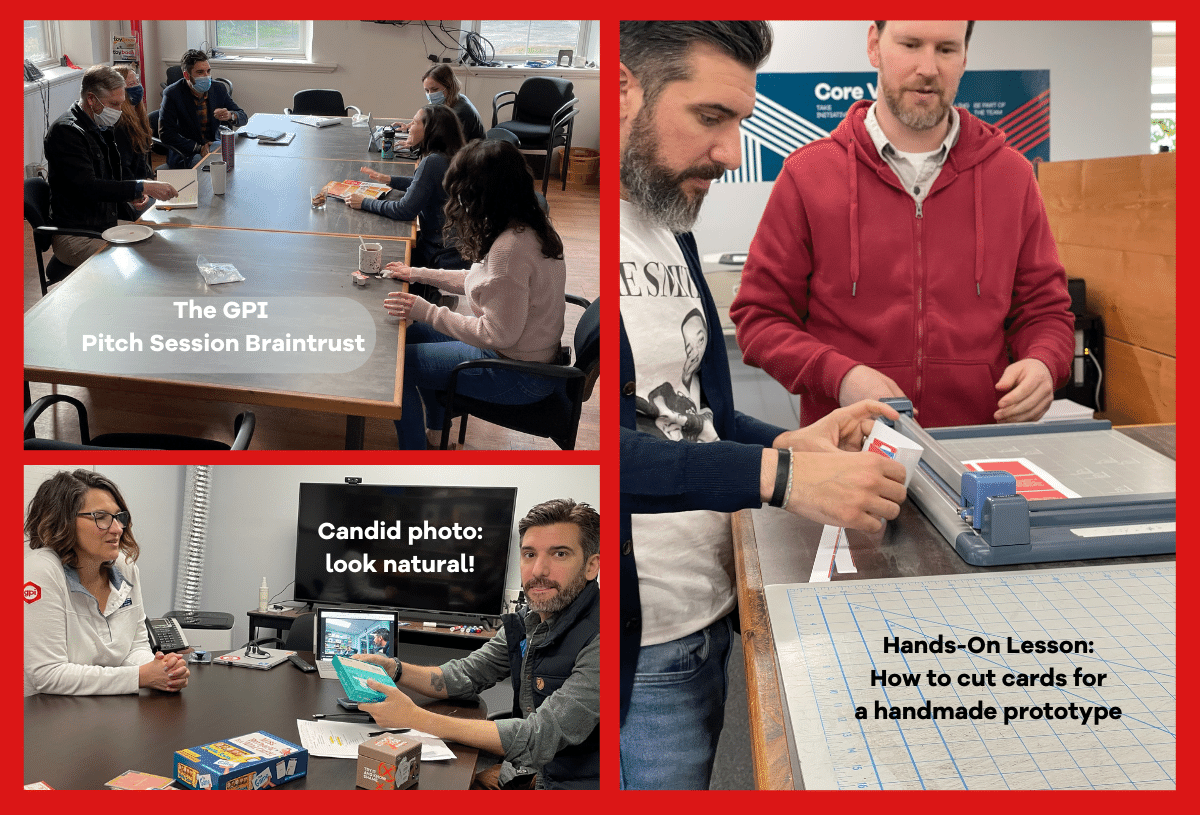This holiday season, GPI will deliver a brand new game to all our partners as a gift (SURPRISE!). GPI has created, developed, designed, and manufactured countless games, so you might ask yourself, “why are they writing about this one?” The answer: because this game is more than physical components and beautiful artwork, we are giving you a three-part blog that will provide you with an inside look at how GPI operates and how GPI can create your next hit game.
Should We Create a Game?
Before we hired an artist or debated the game’s name, we had some critical questions to ask ourselves.
- What is our goal for creating this game, and can we achieve it?
- Do we have the resources and time to finish the game on time?
Most publishers’ goal for making a game is to turn a profit, but that’s not our goal for this game. Our goal for creating this game is twofold: first to sit in the “seat†of our clients and see the process through their eyes and secondly, to highlight the services GPI has added over the last 3 years that allow us to ideate, create, manufacture, test, and ship a game to the end consumers hands. So yes, we can achieve this goal.
The second question about time and resources is a little more difficult for us. We already know we don’t easily have the bandwidth, but as our esteemed leader keeps telling us “pressure makes diamondsâ€. Based on those inspiring words, we ultimately decided the goal is worth the time and work, so we moved to the next phase, creating a schedule.
Creating a schedule:
Admittedly, the schedule has a lot of flexibility built into it and is a longer timeline than normal for a non-strategy game (see above bandwidth comment).
Often the best way to create a schedule is to work backward. Because we want to deliver this game for the holiday season, we wrote a schedule that would allow us to receive the product before Christmas:
- Nov. 30th thru Dec. 5th: Send game to recipients
- Nov. 26th: Air freight games to GPI office
- Nov. 16th: Approve Production copies of game
- Oct. 19th: Approve tooling sample and begin production
- Oct. 3rd: Submit final artwork to factory
- Sept. 14th: Final specs to Art Director
- Sept. 1st: Quote game manufacturing
- June thru Aug.: Playtesting and refining game play
- March thru June, 2022: Game Development Meetings
- Oct. thru Dec, 2021: Spaghetti Session and the Pitch Meetings
- Oct. 11, 2021: Game Brief Creation
In this week’s write-up, we will focus on the Game Brief Creation through Playtesting.
Oct 11, 2021 Game Brief Creation:
Before we start discussing the finer points of the game, we need to lay down a strong foundation for what we want and who is responsible for each part.
The below bullet points are from our Game Brief meeting:
- Our Goal: To create a game, document GPI’s services, and provide a fun holiday present for our partners.
- Our Audience: Our partners, which include tabletop game publishers, toy producers, and any other customers that need our services to design, develop, and/or manufacture.
- Our Timeline: We want to deliver this game to our customers for the 2022 Holiday Season.
- Our Cost: Because we are not selling this game, we don’t have an MSRP, but because we want to show a realistic production, we made a target cost of $3.00/game.
- Responsibilities: We needed an Account Manager and when I joined the team in Jan, the team felt I was
the low man on the totem poleand the perfect candidate for the job. We also had to pick a Project Coordinator but that could come after the specs were created, eventually, we bestowed the honor to Al. David, Tami and Ryan were the original development crew in 2021, but as Al and I joined the GPI team, we were recruited to join the adventure.
At GPI we talk about Spaghetti Sessions, where we eat outlandish amounts of pasta until someone comes up with a winning idea! I kid (though not a bad idea), it’s where we throw ideas (spaghetti) against “the wall†and see what sticks. For this session, no idea is out of bounds: bring your crazy (we have lots of that), bring your outlandish (check, we have that too), and bring your jocularity (we have that in spades!). At this session, we heard ideas for simple card games, elaborate get-out-of-your-chair action games, and ridiculous games that would cost an arm and two legs to manufacture.
This was challenging, mostly from a time standpoint. Everyone was busy with GPI customers so eventually what would happen is a stolen half an hour here, working lunches, beers after work, and marketing meetings hijacked during these months to get the game developed far enough for us to move on to Playtesting. And, as often happens, playtesting often kicks the game back to this stage of the process.
Before we could playtest, we had to print out, cut, glue, and stuff cards into sleeves. With the playtesting components ready, we gathered around the table to test a few ideas. Our first playtest showed that we were not close enough to determining all the components we needed for our game. If we don’t know what components are required, we will not be able to write up a quote. We built a buffer into our schedule, but it felt too early to push the date back, so we scheduled another playtest session before our meeting. Will a single extra playtest session be enough or will we have to go back to the drawing board?


Recent Comments